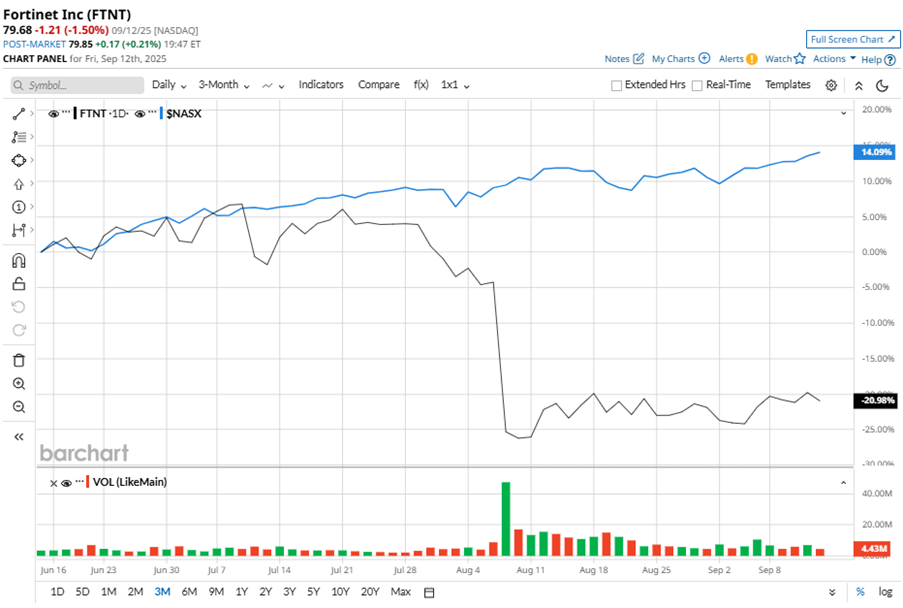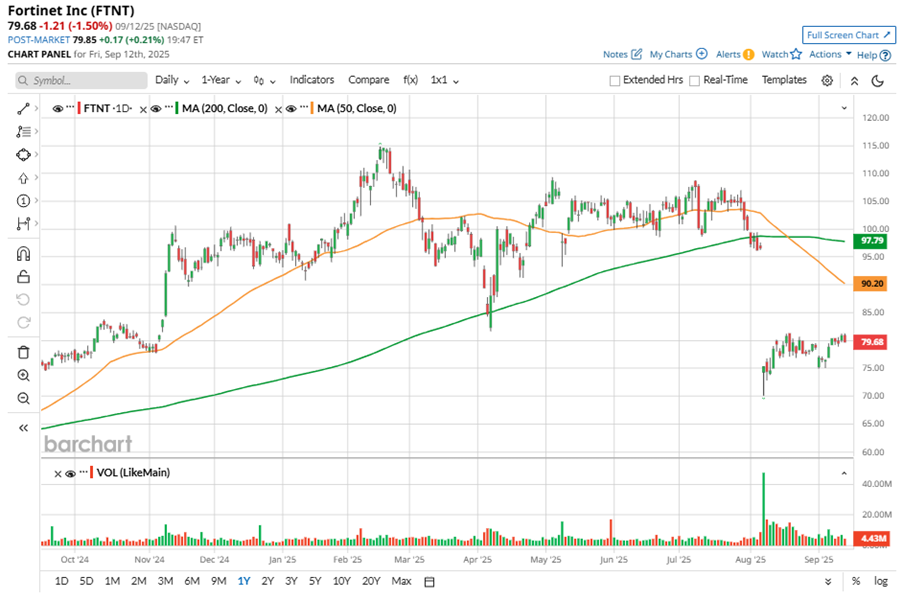/Fortinet%20Inc%20Silicon%20Valley%20office%20sign-by%20Sundry%20Photography%20via%20Shutterstock.jpg)
Fortinet, Inc. (FTNT), headquartered in Sunnyvale, California, provides cybersecurity solutions and the convergence of networking and security. Valued at $61.1 billion by market cap, the company offers network security appliances, software, and subscription services. Fortinet systems integrate the industry's broadest suite of security technologies, including firewalls, VPNs, antivirus, intrusion prevention systems (IPS), web filtering, anti-spam, and traffic shaping.
Companies worth $10 billion or more are generally described as “large-cap stocks,” and FTNT perfectly fits that description, with its market cap exceeding this mark, underscoring its size, influence, and dominance within the software - infrastructure industry. Fortinet's competitive strengths include its unified Security Fabric Platform, a broad portfolio of security solutions, strong performance and reliability, AI-driven security operations, a global reach and support, competitive pricing, and robust R&D investments. Its partner ecosystem and partnerships with major cloud providers further enhance its position.
Despite its notable strength, FTNT slipped 30.6% from its 52-week high of $114.82, achieved on Feb. 18. Over the past three months, FTNT stock has declined 21.6%, underperforming the Nasdaq Composite’s ($NASX) 12.6% gains during the same time frame.

In the longer term, shares of FTNT dipped 15.7% on a YTD basis but climbed 7% over the past 52 weeks, underperforming NASX’s YTD gains of 14.7% and 26% returns over the last year.
To confirm the bearish trend, FTNT has been trading below its 50-day moving average since late July. The stock is trading below its 200-day moving average since early August.

Fortinet's underperformance is attributed to concerns that its firewall upgrade cycle, a key growth driver, is nearing completion, with 40% to 50% of the work already done. Investors are concerned about future expansion challenges and lackluster financial results. The company also faces broader cybersecurity sector challenges, including macroeconomic uncertainty, which causes delayed tech investments and intensifies competitive pressures due to industry consolidation.
On Aug. 6, FTNT reported its Q2 results, and its shares closed down more than 22% in the following trading session. Its adjusted EPS of $0.64 exceeded Wall Street expectations of $0.59. The company’s revenue was $1.63 billion, beating Wall Street forecasts of $1.62 billion. Fortinet expects full-year adjusted EPS in the range of $2.47 to $2.53, and expects revenue to range from $6.7 billion to $6.8 billion.
In the competitive arena of software - infrastructure, Palo Alto Networks, Inc. (PANW) has taken the lead over FTNT, showing resilience with a 7.9% uptick on a YTD basis and 13.7% gains over the past 52 weeks.
Wall Street analysts are cautious on FTNT’s prospects. The stock has a consensus “Hold” rating from the 43 analysts covering it, and the mean price target of $88.30 suggests a potential upside of 10.8% from current price levels.







